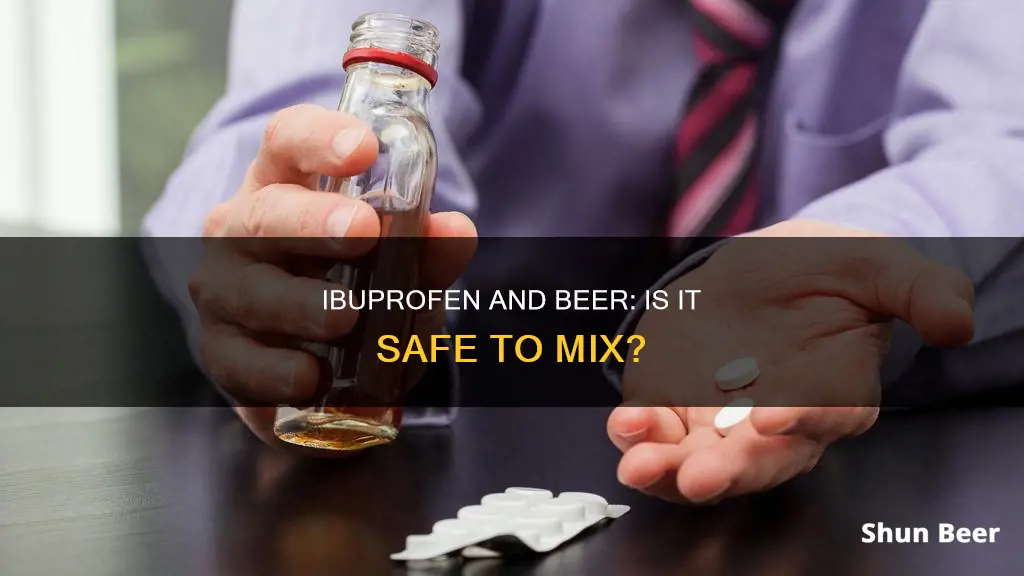
Drinking alcohol and taking medication is a risky combination, and ibuprofen is no exception. While a single glass of beer is usually okay for most people, moderate to excessive drinking can increase the side effects of ibuprofen, such as gastrointestinal bleeding, kidney damage, and liver problems. This is because both substances irritate the stomach and digestive tract, increasing the risk of ulcers and bleeding. Additionally, ibuprofen and alcohol can both cause drowsiness, leading to impaired coordination and slower reaction times. For these reasons, it is generally recommended to avoid drinking alcohol while taking any pain reliever, including ibuprofen.
| Characteristics | Values |
|---|---|
| Is it safe to drink beer after taking ibuprofen? | Generally, it is considered safe to drink a small amount of alcohol while taking ibuprofen. However, it is important to be cautious and avoid it when possible. |
| Risks | Mixing ibuprofen and alcohol can irritate the stomach and intestinal lining, increasing the risk of gastrointestinal bleeding and ulcers. It can also lead to kidney damage, liver problems, and increased drowsiness. |
| Recommendations | It is recommended to wait at least 10 hours after taking ibuprofen before consuming alcohol, as it takes time for the body to eliminate the medication. People with underlying medical conditions, such as liver or kidney disease, high blood pressure, or heart failure, are at higher risk and should consult a doctor or pharmacist. |
What You'll Learn

Ibuprofen and alcohol can cause gastrointestinal bleeding
A study of 1,224 participants showed that regular ibuprofen use raised the risk of gastrointestinal bleeding in people who consumed alcohol. The risk of bleeding increased with the quantity of alcohol consumed, with heavy drinkers experiencing the highest risk. The study also found that occasional ibuprofen use did not increase the risk of gastrointestinal bleeding in patients who drank alcohol.
The signs of gastrointestinal bleeding include ongoing stomach pain, tar-like stools, and blood in your vomit. If you experience any of these symptoms, it is important to seek medical attention.
To reduce the risk of gastrointestinal bleeding, it is recommended to avoid drinking alcohol while taking ibuprofen or any other pain reliever. If you must consume alcohol while taking ibuprofen, limit yourself to one drink, as moderate to excessive quantities can increase the side effects of ibuprofen. It is also important to follow the recommended dosage and not take ibuprofen for longer than necessary to reduce the risk of side effects.
Beer and Braces: Ceramic Care and Drinking
You may want to see also

Long-term use of both can damage your kidneys
While drinking a small amount of alcohol while taking ibuprofen is generally considered safe, long-term use of both substances can damage your kidneys.
Ibuprofen is a nonsteroidal anti-inflammatory drug (NSAID) that is used to relieve pain, swelling, and fever. It is available over the counter under brand names such as Advil, Midol, and Motrin. While ibuprofen is a convenient option for pain relief, it is a strong medication that can cause harmful side effects if not taken correctly.
Long-term use of ibuprofen can damage your kidneys. Ibuprofen affects kidney function by inhibiting the production of prostaglandins, hormones needed to ensure normal urine output. This can lead to acute kidney injury (AKI) or acute renal failure. Additionally, ibuprofen can increase the risk of kidney problems in people with pre-existing kidney disease and extreme athletes prone to kidney impairment.
Alcohol consumption can also harm your kidneys. Heavy drinking puts additional strain on the kidneys and increases the risk of developing chronic kidney disease. When combined with ibuprofen, the risk of kidney damage is significantly increased.
To reduce the risk of kidney damage, it is important to follow the recommended dosage and duration of ibuprofen use. Ibuprofen should be taken for the shortest possible time and at the lowest effective dosage. For long-term pain management, it is advisable to consult a doctor for alternative methods.
In summary, long-term use of both ibuprofen and alcohol can have detrimental effects on kidney function. It is crucial to be cautious when consuming these substances together and to seek medical advice if you have any concerns or existing health conditions.
Topsy Beer: Brewing Process and Science Explained
You may want to see also

Mixing the two can cause drowsiness and a lack of alertness
Mixing ibuprofen and alcohol can lead to drowsiness and a lack of alertness. Both substances can cause drowsiness on their own, and when combined, this effect may be amplified, leading to excessive sleepiness or an inability to function normally. This can result in an increased risk of accidents or unintentional harm to oneself or others.
The combination of ibuprofen and alcohol can also impair your driving ability. Alcohol slows down reaction times and impairs coordination, and ibuprofen can further relax you and make you less alert. Therefore, it is never safe to drink alcohol and drive, and if you drink while taking ibuprofen, you should refrain from driving.
Additionally, mixing ibuprofen and alcohol can increase the risk of gastrointestinal bleeding and kidney damage. Alcohol can irritate the stomach and intestinal tract, and ibuprofen can increase the risk of peptic ulcer disease. When combined, the risk of gastrointestinal bleeding and ulcers increases significantly.
It is important to follow the recommended dosage and duration when taking ibuprofen and to avoid mixing it with alcohol whenever possible. If you have any concerns or questions about mixing ibuprofen and alcohol, it is best to consult your doctor or pharmacist.
Drinking Beer in Your Front Yard: Legal or Not?
You may want to see also

Alcohol can make ibuprofen less effective
While consuming a small amount of alcohol while taking ibuprofen is generally considered safe, mixing the two can make the medication less effective. Alcohol can interfere with some drugs, including ibuprofen, reducing their effectiveness.
Ibuprofen is a nonsteroidal anti-inflammatory drug (NSAID) that relieves pain by blocking prostaglandins, which can lead to inflammation, swelling, and pain. When taken alone, ibuprofen can cause side effects such as nausea, vomiting, dyspepsia, stomach pain, and diarrhoea.
Alcohol can irritate the intestinal tract and stomach, and consuming it with ibuprofen can increase these side effects. Even a small amount of alcohol after taking ibuprofen is risky, and the risks increase with the amount consumed. Consuming alcohol while taking ibuprofen can lead to gastrointestinal bleeding, kidney damage, and a lack of alertness.
The combination of ibuprofen and alcohol can also result in less effective medication. Mixing medications with alcohol can reduce their effectiveness while enhancing their side effects. This means that the pain-relieving effects of ibuprofen may be diminished, while the negative side effects are amplified.
Therefore, it is generally recommended to avoid drinking alcohol while taking any pain relievers, including ibuprofen. If you have concerns or questions about mixing ibuprofen and alcohol, it is best to consult a medical professional for personalised advice.
Beer and Montelukast: Is It Safe to Mix?
You may want to see also

Ibuprofen can irritate the stomach and digestive tract
The risk of gastrointestinal side effects is higher for people over 65, as the risk of gastrointestinal bleeding quadruples. Other factors that increase the risk include a history of indigestion or heartburn, use of corticosteroids, anticoagulants, selective serotonin reuptake inhibitors, or antiplatelets, a history of peptic ulcer or ulcer-related bleeding, and alcohol use.
Alcohol can irritate the stomach lining, and when combined with ibuprofen, the risk of bleeding in the stomach increases. Even a small amount of alcohol after taking ibuprofen is considered risky, and the more you drink, the higher the risk. Consuming a small amount of alcohol while taking ibuprofen is generally considered safe, but it is important to be cautious and avoid it when possible. It is recommended to avoid drinking alcohol while taking any pain relievers, including ibuprofen.
To reduce the risk of stomach irritation, it is advised to take ibuprofen with food or an antacid. A proton pump inhibitor or H2-blocker can also help reduce the risk of gastritis and peptic ulcers. It is important to note that ibuprofen should not be taken with an aluminum-based antacid as this can interfere with its absorption.
PRP Recovery: Can You Drink Beer Post-Procedure?
You may want to see also
Frequently asked questions
One beer is usually okay for most people, but moderate to excessive quantities of alcohol can increase the side effects of ibuprofen. It is recommended to wait at least 10 hours after taking ibuprofen before drinking alcohol.
Both substances irritate the stomach and digestive tract, so combining them increases the risk of ulcers and gastrointestinal bleeding. They can also cause an increased risk of kidney damage and liver problems.
Signs of gastrointestinal bleeding include ongoing stomach ache, tar-like or black stools, and blood in your vomit.
Signs of kidney damage include drowsiness, swelling of the hands and feet, and shortness of breath.
If you have consumed a small to moderate amount of alcohol with ibuprofen, do not drink any more alcohol. Reduce the risk of stomach upset by eating a snack or small meal and drinking water.







